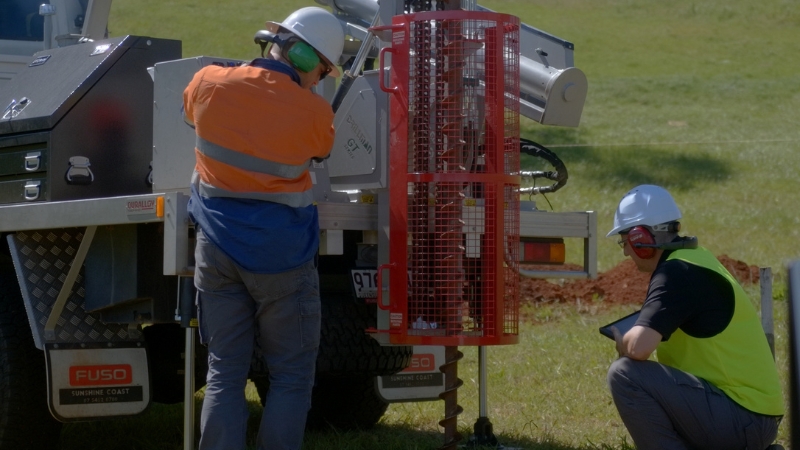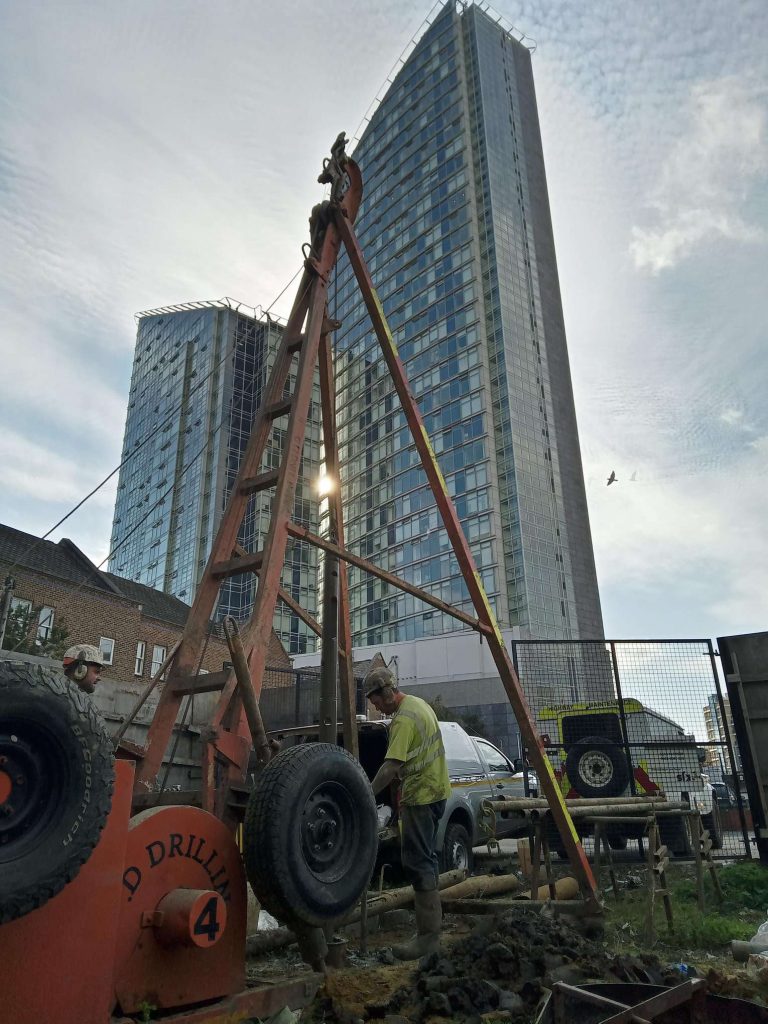How Geo Tech Engineering Supports Large-Scale Construction Projects
How Geo Tech Engineering Supports Large-Scale Construction Projects
Blog Article
Recognizing the Comprehensive Function of Geotechnical Engineers in Ground Examination and Soil Evaluation for Construction Jobs
Geotechnical engineers are important to the success of building and construction projects, supplying crucial insights through thorough ground investigations and soil analysis. Their know-how in assessing soil habits and using innovative screening strategies informs vital choices that maintain architectural honesty and safety.
Duty of Geotechnical Designers
The essential function of geotechnical engineers in building and construction jobs can not be overstated, as they give necessary insights right into dirt behavior and site problems. These professionals are entrusted with analyzing the viability of the ground for various kinds of frameworks, ensuring safety and security and security throughout the building process. Their competence includes a variety of tasks, consisting of site characterization, dirt tasting, and laboratory testing, which are essential for figuring out the physical and mechanical buildings of the soil.
Geotechnical engineers use their findings to create fundamental layouts that fit load-bearing demands and reduce risks connected to dirt liquefaction, negotiation, and slope stability. They play a critical function in determining prospective threats, such as groundwater fluctuations and contamination, which can substantially affect project viability. They team up with architects, civil designers, and specialists to make sure that geotechnical factors to consider are incorporated into the overall design and construction stages.
Ground Investigation Techniques
Ground examination techniques create the backbone of geotechnical design, making it possible for designers to get a detailed understanding of subsurface problems. These methods are crucial for evaluating dirt homes, establishing groundwater levels, and identifying potential geological risks.
Typical techniques consist of borehole boring, which permits the removal of dirt examples at different midsts, supplying critical information for evaluation. In addition, sitting screening strategies, such as Standard Penetration Tests (SPT) and Cone Penetration Tests (CPT), are utilized to examine dirt toughness and thickness straight in the ground.
Geophysical methods also play a significant role in ground investigations. Strategies such as seismic studies and electrical resistivity tomography assistance examine subsurface features without substantial excavation. geotechnical eng. These non-invasive approaches are especially helpful in sensitive or huge locations where interruption need to be decreased
Furthermore, exploratory trenches can be excavated to visually inspect soil layers and identify any type of anomalies. Each of these techniques adds unique understandings, allowing geotechnical engineers to establish accurate site analyses and notify design choices. In summary, a mix of these ground investigation strategies is crucial for effective building tasks, guaranteeing security and architectural stability.
Dirt Analysis Techniques
Dirt analysis techniques are essential for comprehending the physical and chemical residential or commercial properties of soil, which straight influence the layout and construction of structures and other structures. Different strategies are utilized to assess soil attributes, making certain that geotechnical designers obtain exact information for informed decision-making.
One typically utilized technique is grain dimension analysis, which establishes the circulation of particle sizes within a soil sample. This is important for categorizing dirt kinds and forecasting their actions under lots. Another important method is Atterberg limitations testing, which examines the plasticity and wetness web content of fine-grained dirts, giving insights into their engineering homes.

Area tests, such as Standard Infiltration Tests (SPT) and Cone Penetration Examinations (CPT), offer valuable in-situ information relating to soil strength and stratification. Jointly, these soil evaluation techniques develop the structure of geotechnical investigation, permitting engineers to develop efficient and safe frameworks tailored to the specific problems of the site.
Danger Mitigation Approaches
Executing reliable danger reduction strategies is crucial for geotechnical engineers to resolve potential obstacles in construction tasks. These strategies are vital in identifying, analyzing, and managing dangers associated with soil conditions, website security, and groundwater you could try these out fluctuations, which can negatively influence task outcomes.
One main method entails performing comprehensive site examinations that use innovative geophysical techniques and extensive dirt tasting. By getting exact data on subsurface conditions, engineers can make enlightened choices on style and construction approaches. Furthermore, using anticipating modeling devices permits the simulation of numerous scenarios, enabling designers to foresee potential problems and implement preventive measures.
Furthermore, developing clear interaction channels among project stakeholders cultivates a joint technique to run the risk of management. Normal updates and appointments make certain that all events understand the advancing website conditions and can adapt their approaches accordingly.

Effect On Construction Jobs
The efficiency of danger reduction approaches straight affects the overall success of construction projects. Geotechnical engineers play a critical function in this domain, as their expertise in ground investigation and soil analysis notifies vital choices throughout the building and construction procedure. By properly analyzing dirt problems and recognizing potential threats, these professionals make it possible for task groups to create efficient services that reduce threats related to ground instability, water seepage, and other geotechnical challenges.
The influence of detailed geotechnical evaluation is apparent in various facets of building and construction projects, including price administration, project timelines, and architectural honesty. Early recognition of problems enables prompt interventions, minimizing pricey delays and budget overruns. In addition, a detailed understanding of site problems improves the layout and design process, making sure that structures are constructed to stand up to environmental stress and potential all-natural disasters.
Eventually, the payments of geotechnical engineers are indispensable to the successful implementation of construction tasks. Their work not only web cultivates security and conformity with regulations yet likewise boosts the long-term sustainability of structures, guaranteeing that they perform effectively throughout their desired life expectancy. The partnership in between other stakeholders and geotechnical groups is crucial for accomplishing optimum outcomes in building ventures.
Conclusion
In final thought, geotechnical designers perform an important feature in construction projects through detailed ground examinations and dirt evaluations. Their competence in analyzing dirt behavior, employing various investigation strategies, and applying risk mitigation methods dramatically adds to the architectural honesty and safety of built environments. By collaborating with multidisciplinary teams, these professionals enhance project efficiency and ensure compliance with safety criteria, inevitably leading to successful construction end results and lowered possible threats.
Geotechnical designers are indispensable to the success of building and construction tasks, supplying vital insights through extensive ground investigations and dirt evaluation.The essential role of discover here geotechnical engineers in building and construction jobs can not be overstated, as they provide essential understandings into soil actions and website conditions. Their knowledge includes a large array of tasks, including site characterization, dirt sampling, and lab screening, which are crucial for figuring out the physical and mechanical residential properties of the dirt.
By precisely evaluating dirt conditions and recognizing prospective hazards, these specialists allow task teams to design efficient solutions that minimize risks connected with ground instability, water infiltration, and various other geotechnical challenges.
In final thought, geotechnical designers carry out a vital feature in construction jobs via detailed ground examinations and soil evaluations.
Report this page